Following Muhammad
Rethinking Islam in the Contemporary World
By Carl W. Ernst
272 pp., 5.25 x 8.25, 8 illus., notes, bibl., index
Not for Sale in the British Commonwealth (except Canada), Europe, the Middle East, or South Asia
-
Paperback ISBN: 978-0-8078-5577-5
Published: August 2004 -
E-book EPUB ISBN: 978-0-8078-7580-3
Published: October 2005 -
E-book PDF ISBN: 979-8-8908-7863-2
Published: October 2005
Islamic Civilization and Muslim Networks
Buy this Book
- Paperback $32.50
- E-Book $19.99
- Audiobook
For Professors:
Free E-Exam Copies
Awards & distinctions
Recipient of the 2004 Bashrahil Prize for Outstanding Cultural Achievement in the Humanities
A 2004 Choice Outstanding Academic Title
About the Author
Carl W. Ernst is W. R. Kenan Professor of Religious Studies at the University of North Carolina at Chapel Hill. A fellow of the American Academy of Arts and Sciences, he maintains the website www.unc.edu/~cernst/islam.htm, which provides up-to-date links to resources for learning about Islam. Ernst is author of Sufi Martyrs of Love: Chishti Sufism in South Asia and Beyond, among other books.
For more information about Carl W. Ernst, visit
the
Author
Page.
Reviews
"[A] thoughtful and finely balanced primer on contemporary Islam." —New York Review of Books
"An impressive scholarly work."—The Telegraph-Calcutta
"Well-written and lucid. . . . The book's narrative flow is generally masterful. Ernst successfully moves from present to past and back again in a manner that is both logical and clear to follow. . . . An elegant and masterful presentation of a religious tradition in an accessible manner, as well as a heartfelt plea for non-Muslims to understand it." —American Journal of Islamic Social Sciences
"A pleasure to read. Ernst has a multilayered and self-assured understanding of Islam, and his writing exemplifies a fluency in explaining it that is unique to him. . . . Delicate and complex points about Islam as a religion and culture, about Sufism, and even about Osama bin Laden, flow off the page effortlessly. . . . The book's greatest strength is Ernst's unrelenting but well-reasoned critique of how the West has consistently marginalized Islam and Muslims from the first encounters onward. Ernst is fair, however— while he admonishes the West for indulging in negative and inaccurate stereotypes of Islam and Muslims, he calls upon Muslims to participate fully in the pluralistic society the world has become."—Publishers Weekly
"In seeking to restore a sense of proportion and balance to the image of Islam for his Western readers, Ernst gives proper weight to the layers of mystical humanism, philosophical speculation and hermeneutical flexibility that are no less a part of the Islamic tradition than the legacies of conquest and militancy. He also points out that intolerance and bigotry are far from being the exclusive prerogative of the Western media industries." —Times Literary Supplement
"A helpful resource for university religion departments. It is not a straight 'Islam 101' resource, and because of that, it is very refreshing. . . . A very helpful tool as an introduction to a course on Islam and contemporary religion."—Journal of the American Academy of Religion
Multimedia & Links
Visit the author's website at unc.edu/~cernst/.




